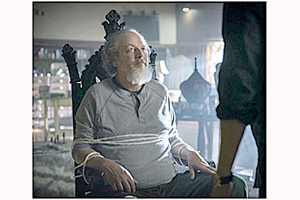Features
Winnipeg’s own Jonas Chernick discusses how he made his latest movie, “JAMES VS. HIS FUTURE SELF”

By BERNIE BELLAN
Elsewhere on this website we have an article about a new movie, titled “JAMES VS. HIS FUTURE SELF”, which was slated to receive its Winnipeg premiere April 3.
As events have overtaken the original plan, filmmaker Jonas Chernick, who wrote, produced, and starred in the movie explained that the Canadian distributors of the film have changed how the movie will now roll out.
Instead of being shown in theatres, the movie will now go straight to video on April 3, including digital release on iTunes and Video on Demand through such providers as Shaw, Bell MTS, and Rogers.
We had a chance to talk with Chernick while he was cooped up in his Toronto home – along with his wife, two kids, a dog and a cat.
For those of our readers who are not already familiar with Chernick’s background, here’s a brief summary: He’s a graduate of Grant Park High School and the University of Manitoba. He is also an alumnus of Camp Massad, where he was both a camper and a counselor. He served on the staff of the Rady Jewish Community Centre and has appeared in four different productions of the Winnipeg Jewish Theatre over the years.
“JAMES VS. HIS FUTURE SELF” marks the third film that Chernick has written and produced and in which he has starred. The previous two were “My Awkward Sexual Adventure” (released in 2012) and “Borealis” (released in 2016).
As someone who has always maintained a strong connection to the Winnipeg Jewish community, we have been chronicling Chernick’s career in these pages for years. Making films is not an easy route to follow, but Chernick has shown that it is possible to forge a successful career path despite the many challenges that await any aspiring filmmaker.
But now, with the latest hurdle to overcome in the form of a pandemic virus that has thrown all the previous plans for unveiling the film across Canada out the window, Chernick is still looking forward to seeing the film find success in a different way than he might have otherwise anticipated – by going straight to video, something that usually doesn’t occur until at least six months after a movie has been shown in theatres.
We began our interview by asking about how the COVID-19 pandemic has altered plans for not just “JAMES VS. HIS FUTURE SELF”, but so many other movies that were slated to be released soon?
Chernick said: “They actually have announced that several major releases are going to come straight to our living rooms. ‘Trolls’ – which was expected to be a huge blockbuster, is going to be released straight to digital.”
I wondered whether Chernick himself was going to take a financial hit over the change in plans for how the movie is going to be released.
Chernick explained that “the way it works with my film and the way I think most films – certainly Canadian films, is we’ve already sold the Canadian rights to the movie to a Canadian distribution company; in our case, they’re called Northern Banner Releasing. I’ve done a number of films with them; they’re wonderful partners – and they’ve had the Canadian rights to this movie for years.
“The way it works is they help us make the film by prebuying the Canadian rights, so the revenue from Canada goes through them and, if the movie does very well – sure, we’ll get something called ‘overages’, which means some of the profits will flow through to the producers, including me. But, that’s not really a concern for my team. We just want the movie to be seen by as many people as we can. Nobody gets into the independent film business to make millions of dollars.
“Luckily for me, as an actor, writer, producer, story editor, consultant – I do fine with multiple projects, but nobody is in this to become a millionaire. We’re artists, we made a movie – and we’re very proud of it. We made one that we think people will really like – it’s an audience friendly movie.”
I said to Chernick that I always enjoy helping to promote one of his new movies, saying to him “It’s like having a baby again: You go through the same steps. This time around though, the baby’s in the hospital and you’re not sure when it’s going to come out.”
It had been four years since I last spoke with Chernick – just after “Borealis” was released, and I noted that he had mentioned that back in 2016, while he ”had several irons in the fire”, there was one movie in particular that he thought had the best chance of being made.
Chernick agreed, saying: “This was the one that people were most excited about when I pitched it, so I felt like we had a good chance at getting this one made.”
I noted that this was now the third film that Chernick had written and produced, and in which he had starred – and about which I had now written, so some day I will be able to write about “the pantheon of Jonas Chernick movies” because I’ve never used the word “pantheon” in a sentence before.
It was following release of “My Awkward Sexual Adventure” in 2012 that Chernick met the guy who eventually became the director of “JAMES VS. HIS FUTURE SELF”, Jeremy LaLonde. They were both at a California film festival and someone introduced them to each other as the two Canadians who had just made “sex comedies”. In time, Chernick would end up starring in a LaLonde film called “How to Plan an Orgy in a Small Town” (which can be purchased on iTunes, Chernick said).
As people who are involved in the film industry are prone to do, Chernick and LaLonde traded ideas – and scripts, back and forth, bouncing ideas off one another, until the idea for “JAMES VS. HIS FUTURE SELF” began to take hold – in 2016.
According to Chernick though, before they began to focus on “JAMES VS. HIS FUTURE SELF”, LaLonde had asked him whether Chernick had “any ideas in the science fiction world” and Chernick said “I have one idea that’s not much of an idea and I kind of pitched it to him in probably two sentences – and he loved it and said ‘let’s develop that, let’s flesh that out’, and very quickly we turned that into what became “JAMES VS. HIS FUTURE SELF”.
We discussed how the drastic change in how the movie is going to be released might affect the kind of “buzz” that a movie needs to develop in order to be successful.
Chernick explained: “Normally a movie that gets released on digital or VOD (Video on Demand) doesn’t receive a lot of media attention because there are so many titles, but in this case we already have a lot of attention. We’ve won a bunch of awards and we’ve played at a bunch of prestigious festivals, and the media in Canada have been very supportive – so, thanks to people like you and other outlets, it’s going to make a splash and people are going to know about it.
“Everybody’s at home! What else are they going to do? You can have a laugh, feel charmed – and enjoy yourself for an hour and a half.”
I said to Chernick that I was amazed how many reviews of “JAMES VS. HIS FUTURE SELF” I had actually been able to find online. “It’s amazing,’ I said. “Your film has only been on the festival circuit, yet it already has so many reviews.”
“You’re right,” Chernick answered. “It’s only been on the festival circuit, but I will say that I am a tireless soldier when it comes to promoting my movies.”
“And almost all the reviews are favourable,” I noted – except for one, “from a guy who complained that the movie was a ‘rom com’ – early 2000s vintage. “
“But, when I read that,” I said to Chernick , “I thought to myself: ‘I love rom coms. I wish they would make more of them.”
“Absolutely,” Chernick said. “All of my movies are romantic comedies. I think most comedies are rom coms. We call this a ‘sci fi rom com’, but it’s less sci fi than it is rom com. It’s truly a romantic comedy hiding inside a time travel movie – with very little time travel…just enough to satisfy the science fiction geeks, as we learned when we were programmed by one of the top science fiction film festivals in the world – the Toronto After Dark Festival.
“We were worried that the audience was going to turn on us at that festival, but we ended up winning four awards at that festival.”
I noted that I wasn’t familiar with that particular festival. I said that I assumed it “was a festival for people who didn’t like to go out in the day time” (which got a laugh from Chernick).
Chernick went on to say that “the real surprise for us was getting nominated for Canadian Screen Awards because this is not the kind of film that typically gets acknowledged by the Academy (of Canadian Cinema and Television). This is a fun comedy with some raunchy humour.”

At that point in the interview I said to Chernick that I wanted to switch gears and, rather than talk more about how the film was made and how it’s going to be distributed, I wanted to talk about Daniel Stern, who really steals the movie when he appears in it.
I said that I purposely hadn’t read much about the movie before I watched it, but when I saw Daniel Stern appear for the first time, I said to myself: “I know that guy. He was in ‘Home Alone’. “ (Later, Chernick pointed out that Stern was also made famous for having been in the “City Slicker” movies.)
(Note: Stern plays an older version of Chernick, who comes back in time to try and persuade the character played by Chernick to abandon his dreams of time travel.)
“Where has Daniel Stern been all these years?” I asked Chernick.
“He kind of stepped away from the limelight after the ‘Home Alone’ and ‘City Slicker’ movies were such blockbuster,” Chernick explained. ”He wrote and directed some films and some TV and then, because he didn’t have to work, he kind of walked away a little bit and he became a reclusive artist.
“He lives on a property in California – away from all the action, and he makes gigantic bronze sculptures in his art studio – and sells them all over the world. He’s an amazing artist, but he hasn’t really done a lot of movies in the last several years because he doesn’t really like leaving home.
“But we went after him pretty aggressively because we just felt that he was the perfect guy for this part. We had a really short list that he was at the top of – for a bunch of reasons, but mostly because we have this nostalgic relationship with Daniel Stern based on his movies from the 80s and 90s – and our movie is about nostalgia; it’s about looking back.
“Also, he’s similar enough to me in his personality and his persona – his lovable loser, Jewish, nebbishy vibe – from his earlier years, but he’s become something else at the same time. He’s now a big guy (physically – as viewers might be surprised to see. Man, has Stern ever put on a lot of weight!) and somewhat intimidating, so we really liked the idea that he was once like me but that he’s evolved into something other than that – and we found that really interesting for his part.”
“And you provide a credible explanation as to why there’s no real physical similarity – except for one part of your anatomy (cue the penis jokes),” I suggested. “Now, that’s one that I found a bit of a stretch – no pun intended.”

I also asked Chernick about another actor who appears in the movie who, I admit, I had never heard of – until Chernick filled me in as to who she is and where I might have seen her. The character, Dr. Crowley, is head of a world class lab in which Chernick’s character is also a scientific researcher.
“Her name is Frances Conroy,” Chernick said. “She’s in many ways an acting icon. She was the matriarch on one of the most ground-breaking shows of all time: HBO’s ‘Six Feet Under’.”
“Oh,” I said, “but you know I never watched that.” (which shouldn’t excuse my ignorance because I usually am quite au courant with useless trivia).
“That show was nominated for five or six Emmys every year,” Chernick added. “She’s also a Broadway star. She’s also been one of the leads on a very popular show called “American Horror Story” (which I always assumed was a story about my own family) and most recently she played the mother of the Joker in the “Joker” movie.”
“Oh, that’s her,” I exclaimed, showing once again my ignorance of an all-important fact.
“Her character has this turn of phrase,” I noted, “when she reacts to someone swearing. What does she call it?” I asked.
“Swear scream…. She says it as if it’s a common phrase,” Chernick explained – as in, “If you’re going to ‘swear scream’ someone’s name, at least have something compelling to say when you finally have their attention.’ “
I said that she’s so ‘self contained’ when she appears in the movie – constantly showing incredible restraint when she’s subjected to a barrage of profanity from one or another of the characters in the movie, especially the character played by Daniel Stern. Also, I wondered, considering how she’s so terrific in her relatively small part, couldn’t Chernick have written a larger role for her?
“I think one of the appealing things for her,” Chernick explained, “is that this was an extended cameo for her. This is something that she would be able to come in and do relatively quickly. Now, it should be noted that, being the pro she is, she didn’t treat it that way at all. She had read so many books on particle physics (Conroy plays the part of a particle physicist, as does Chernick), she was so prepared – she was over prepared – she blew our minds how great she was.”
I said to Chernick that he must be so disappointed he won’t be able to premiere his movie in person in front of a Winnipeg audience.
“I was really excited to be there in front of my home town audience,” Chernick admitted, “with friends and family, but we’re going to try to do some sort of question and answer session online via Reddit or one of these online chat systems.”
I asked whether there’s anything else Chernick might like to add.
He said that “people are running out of things to watch right now. Why not watch a funny, entertaining movie by a Winnipeg Jew?”
Then, I thought to add the most important question that I had forgotten to ask:
“When is the movie going to open in Lithuania?” (in reference to the fact that the Lithuanian remake of “My Awkward Sexual Adventure”, titled “Nepatyres” (or “Unexperienced” in English) had the third best box office opening for any movie ever shown in that country).
Chernick laughed and said, “it’s opening (or slated to open) in the United States on May 1st and in the U.K. on April 27th, but I’m not sure about Lithuania.”
“The Baltic states will be key to your success,” I suggested.
Features
Are Niche and Unconventional Relationships Monopolizing the Dating World?

The question assumes a battle being waged and lost. It assumes that something fringe has crept into the center and pushed everything else aside. But the dating world has never operated as a single system with uniform rules. People have always sorted themselves according to preference, circumstance, and opportunity. What has changed is the visibility of that sorting and the tools available to execute it.
Online dating generated $10.28 billion globally in 2024. By 2033, projections put that figure at $19.33 billion. A market of that size does not serve one type of person or one type of relationship. It serves demand, and demand has always been fragmented. The apps and platforms we see now simply make that fragmentation visible in ways that provoke commentary.
Relationship Preferences
Niche dating platforms now account for nearly 30 percent of the online dating market, and projections suggest they could hold 42 percent of market share by 2028. This growth reflects how people are sorting themselves into categories that fit their actual lives.

Some want a sugar relationship, others seek partners within specific religious or cultural groups, and still others look for connections based on hobbies or lifestyle choices. The old model of casting a wide net has given way to something more targeted.
A YouGov poll found 55 percent of Americans prefer complete monogamy, while 34 percent describe their ideal relationship as something other than monogamous. About 21 percent of unmarried Americans have tried consensual non-monogamy at some point. These numbers do not suggest a takeover. They suggest a population with varied preferences now has platforms that accommodate those preferences openly rather than forcing everyone into the same structure.
The Numbers Tell a Different Story
Polyamory and consensual non-monogamy receive substantial attention in media coverage and on social platforms. The actual practice rate sits between 4% and 5% of the American population. That figure has remained relatively stable even as public awareness has increased. Being aware of something and participating in it are separate behaviors.
A 2020 YouGov poll reported that 43% of millennials describe their ideal relationship as non-monogamous. Ideals and actions do not always align. People answer surveys about what sounds appealing in theory. They then make decisions based on their specific circumstances, available partners, and emotional capacity. The gap between stated preference and lived reality is substantial.
Where Young People Are Looking
Gen Z accounts for more than 50% of Hinge users. According to a 2025 survey by The Knot, over 50% of engaged couples met through dating apps. These platforms have become primary infrastructure for forming relationships. They are not replacing traditional dating; they are the context in which traditional dating now occurs.
Younger users encounter more relationship styles on these platforms because the platforms allow for it. Someone seeking a conventional monogamous partnership will still find that option readily available. The presence of other options does not eliminate this possibility. It adds to the menu.
Monopoly Implies Exclusion
The framing of the original question suggests that niche relationships might be crowding out mainstream ones. Monopoly means one entity controls a market to the exclusion of competitors. Nothing in the current data supports that characterization.
Mainstream dating apps serve millions of users seeking conventional relationships. These apps have added features to accommodate other preferences, but their core user base remains people looking for monogamous partnerships. The addition of new categories does not subtract from existing ones. Someone filtering for a specific religion or hobby does not prevent another person from using the same platform without those filters.
What Actually Changed
Two things happened. First, apps built segmentation into their business models because segmentation increases user satisfaction. People find what they want faster when they can specify their preferences. Second, social acceptance expanded for certain relationship types that previously operated in private or faced stigma.
Neither of these developments amounts to a monopoly. They amount to market differentiation and cultural acknowledgment. A person seeking a sugar arrangement and a person seeking marriage can both use apps built for their respective purposes. They are not competing for the same resources.
The Perception Problem
Media coverage tends toward novelty. A story about millions of people using apps to find conventional relationships does not generate engagement. A story about unconventional relationship types generates clicks, comments, and shares. This creates a perception gap between how often something is discussed and how often it actually occurs.
The 4% to 5% practicing polyamory receive disproportionate coverage relative to the 55% who prefer complete monogamy. The coverage is not wrong, but it creates an impression of prevalence that exceeds reality.
Where This Leaves Us
Niche relationships are not monopolizing dating. They are becoming more visible and more accommodated by platforms that benefit from serving specific needs. The majority of people seeking relationships still want conventional arrangements, and they still find them through the same channels.
The dating world is larger than it was before. It contains more explicit options. It allows people to state preferences that once required inference or luck. None of this constitutes a takeover. It constitutes an expansion. The space for one type of relationship did not shrink to make room for another. The total space grew.
Features
Matthew Lazar doing his part to help keep Israelis safe in a time of war

By MYRON LOVE It is well known – or at least it should be – that while Israel puts a high value of protecting the lives of its citizens, the Jewish state’s Islamic enemies celebrate death. The single most glaring difference between the opposing sides can be seen in the differing approach to building bomb shelters to protect their populations.
Whereas Hamas and Hezbollah have invested untold billions of dollars over the past 20 years in building underground tunnels to protect their fighters while leaving their “civilian” populations exposed to Israeli bombs, not only has Israel built a highly sophisticated anti-missile system but also the leadership has invested heavily in making sure that most Israelis have access to bomb shelters – wherever they are – in war time.
While Israel’s bomb shelter program is comprehensive, there are still gaps – gaps which Dr. Matthew Lazar is doing his bit to help reduce.
The Winnipeg born-and raised pediatrician -who is most likely best known to readers as a former mohel – is the president of Project Life Initiatives – the Canadian branch of Israel-based Operation Lifeshield whose mission is to provide bomb shelters for threatened Israeli communities.
Lazar actually got in on the ground floor – so to speak. It was a cousin of his, Rabbi Shmuel Bowman, Operation Lifeshield’s executive director, who – in 2006 – founded the organization.
“Shmuel was one of a small group of American olim and Israelis who were visiting the Galilee during the second Lebanon war in 2006 and found themselves under rocket attack – along with thousands of others – with no place to go,” recounts Lazar, who has two daughters living in Israel. “They decided to take action. I was one of the people Shmuel approached to become an Operation Lifeshield volunteer.
Since the founding of Lifeshield, Lazar reports, over 1,000 shelters have been deployed in Israel. The number of new shelter orders since October 7, 2023 is 149.
He further notes that while the largest share of Operation Lifeshield’s funding comes from American donors, there has been good support for the organization across Canada as well.
One of the major donors in Winnipeg is the Christian Zionist organization, Christian Friends of Israel (FOI) Canada which, in September, as part of its second annual “Stand With Israel Support” evening – presented Lazar and Operation Lifeshield with a cheque for $30,000 toward construction of a bomb shelter for the Yasmin kindergarten in the Binyamina Regional Council in Northern Israel.
Lazar reports that to date the total number of shelters donated by Friends of Israel Gospel Ministry (globally) is over 100.
Lazar notes that the head office for Project Life Initiatives is – not surprisingly – in Toronto. “We communicate by telephone, text and Zoom,” he says.
He observes that – as he is still a full time pediatrician – he isn’t able to visit Israel nearly as often as he would like to. He manages to go every couple of years and always makes a point of visiting some of Operation Lifeshield’s projects.
(He adds that his wife, Nola, gets to Israel two or three times a year – not only to visit family, but also in her role as president of Mercaz Canada – the Canadian Conservative movement’s Zionist arm.)
“This is something I have been able to do to help safeguard Israelis,” Lazar says of his work for Operation Lifeshield. “This is a wonderful thing we are doing. I am glad to be of help. ”
Features
Patterns of Erasure: Genocide in Nazi Europe and Canada

By LIRON FYNE When we think of the word genocide, our minds often jump to the Holocaust, the mass-scale, systemic government-led murder of six million Jews by Nazi Germany during the Second World War, whose unprecedented scale and methods led to the very term ‘genocide’ being coined. On January 27th, 2026, we will bow our heads for International Holocaust Remembrance Day, the 80th year of remembrance.
Less frequently do we connect genocidal intent to the campaign against Indigenous peoples in Canada; the forced displacement, cultural destruction, and systematic killing that sought to erase Indigenous peoples. The genocide conducted by the Nazis and the genocidal intent of the Canadian government, though each unique in scale, motive, and implementation, share many conceptual similarities. Both were driven by ideologies of racial superiority, executed through governmental precision, and justified by the perpetrators as a moral mission.
At their core rests the concept of dehumanization. In Nazi Germany, Jews were viewed as subhuman, contaminated, and a threat to the ‘Aryan’ race. In Canada, Indigenous peoples were represented as obstacles to ‘progress’ and seen as hurdles to a Christian, Eurocentric nation. These ideas, this dehumanization, turned human beings into problems to be solved. Adolf Hitler called it the ‘Jewish question,’ leading to an official policy in 1942 called the ‘Final Solution to the Jewish Question,’ whereas Canadian officials called it the ‘Indian problem.’ The language is similar, a belief that one group’s existence endangers the destiny of another. The methods of extermination differed in practice and outcome, but the language of intent resembles one another.
The Holocaust’s concentration camps and carefully engineered gas chambers were designed for efficient, industrial-scale killing, resulting in mass murder. The well-organized plan of systematic degradation, deadly riots, brutal camp conditions, and designated killing centres were only a few of the ways the Nazis worked to eliminate the Jews. The Canadian government’s weapons were policy, assimilation and abandonment. Such as the Indian Act, reserves, and residential schools, which were all meant to ‘kill the Indian in the child,’ cutting generations off from their languages, families, and cultures. Thousands of Indigenous children died in residential schools, buried in unmarked graves near schools that called themselves places of learning. Both systems were backed by either religion or ideology; Nazi ideology brought together racist eugenic policies and virulent antisemitism, while Canada’s genocidal intent was supported by Christian Protestantism claiming to save Indigenous souls by erasing their heritage.
The Holocaust was a six-year campaign of complete industrialized extermination, mass murder with a mechanized intent, on a scale that remains historically unique. The Truth and Reconciliation Commission describes Canada’s indigenous genocide as a cultural one that unfolded over centuries through assimilation and the destruction of indigenous languages and identities. The Holocaust ended with the liberation of the camps and a global recognition of the atrocities committed. However, the generational trauma and dehumanization of antisemitism carry on. For Indigenous peoples in Canada, the effects of the genocidal intent continue to this day, visible in displacement, poverty, and intergenerational trauma. While these histories differ in form and timeline, both are rooted in dehumanization and the belief that some lives are worth less than others.
A disturbing similarity lies in the aftermath: silence and denial. The Holocaust forced the world to confront the atrocity with the vow of ‘Never Again,’ which has now been unearthed and reformed as ‘Never Again is Now,’ after the October 7th, 2023, massacre by Hamas. The largest massacre of Jewish people since the Holocaust, and the denial of the atrocities committed on October 7th, highlight the same Holocaust denial we see rising around the world. In Canada, for decades, the genocidal intent was hidden behind narratives of kindness and social progress. Only in recent years, through survivor testimony for the Truth and Reconciliation Commission, and the discovery of unmarked graves, has the truth gained recognition. But acknowledgment without justice risks repeating the same patterns of erasure.
Comparing these atrocities committed is not about comparing pain or scale; it is about understanding the shared systems that enabled them. Both demonstrate how racism, superiority, and dehumanization can be used to justify the destruction of human beings. Remembering is not enough in Canada. True remembrance demands accountability, land restitution, reparations, and education that confronts Canada’s ongoing colonial legacy. When we say ‘Never Again is Now’, we hold collective action to combat antisemitism in all forms. The same applies to Truth & Reconciliation; it must be more than a slogan; we must apply action to Truth & ReconciliACTION.
Liron Fyne is a 12th-grade student at Gray Academy of Jewish Education in Winnipeg. They are currently a Kenneth Leventhal High School Intern at StandWithUs Canada, a non-profit education organization that combats antisemitism.


